On Monday, November 2, the Department of Homeland Security (DHS) published a proposed rule intended to change the H-1B lottery process and further restrict H-1B eligibility. The rule would replace the random lottery selection process with a weighted selection system favoring H-1B registrations where the employer has agreed pay the highest wage level in the Department of Labor’s four-tiered wage system.
If finalized, this proposed rule would present a further challenge to future H-1B sponsorship. DHS and the Department of Labor (DOL) issued regulations in early October which also make H-1B sponsorship much more challenging. Mintz’ analysis of those regulations can be found here.
Background
The H-1B “cap” or “quota” is a limitation on the number of “new” H-1B petitions that can be approved in a fiscal year. The current quota is 85,000, of which 20,000 are reserved for individuals who hold a United States master’s or higher degree.
For the past eight years, there have been far more petitions filed than available H-1B numbers. As a result, USCIS historically has performed a computer-generated lottery to select which petitions would be processed. Historically USCIS has accepted H-1B cap-subject petitions in the first five business days in April, six months before the start of the fiscal year. Last year, USCIS implemented a new H-1B registration system. Under the current system, employers submit an electronic registration to USCIS for selection in the H-1B cap lottery, and then submit a full H-1B petition to USCIS after selection. Additional information on the H-1B registration system can be found here.
Proposed Changes
If during the H-1B registration period there are more registration submissions than available petitions under the quota of 85,000, USCIS would rank and select registrations based on the highest wage level having been selected by the petitioner in the DOL’s four-tiered wage system.
As described in one of our recent alerts, the DOL’s Occupational Employment Statistics (OES) wage data is broken down as follows:
|
Wage Level |
Skill Level |
Percentile of data for wage level |
|
Level I |
Entry Level |
45th |
|
Level II |
Qualified |
62nd |
|
Level III |
Experienced |
78th |
|
Level IV |
Fully Competent |
95th |
Under the proposed system, if employers submit more than 85,000 registrations, USCIS will first select those registrations submitted with a Level IV or higher wage; if there are still available H-1B quota numbers, the agency will then proceed to rank and select H-1B registrations in descending order through Levels III, II and I.
The proposed rule also prevents employers from subsequently filing an amended H-1B petition at a lower wage level after an H-1B cap lottery petition is selected and approved by USCIS.
Issues with the Proposed Rule
If implemented, we expect that the proposed rule will have a chilling effect on the ability of U.S. employers to hire foreign professional workers for an initial H-1B petition under the cap lottery. Specific concerns about the proposed rule include the following:
-
The H-1B cap lottery is often used by employers to hire recent university graduates who are employed pursuant to F-1 student Optional Practical Training (OPT). These hires tend to be employed in entry-level or mid-level professional positions. It is rare that an H-1B cap petition is filed for a role that rises to the DOL’s “Fully Competent” skill level.
-
The DOL’s October 6 Interim Final Rule dramatically increased the wages for virtually every professional position. In many instances the wages have increased by $40,000 - $50,000 across each wage level. If the DOL rule is not overturned in federal court, employers will need to pay astronomically high wages for H-1B cap beneficiaries.
-
In many other instances, the DOL has claimed that there is insufficient wage data, which results in a “default” prevailing wage for all levels at the national prevailing wage rate of $208,000. In instances where DOL indicates that there is no wage data, all four wage levels are set at $208,000—a wage that is inconsistent with DOL’s own rules about the use of wage levels that are specific to the work location.
Impact to U.S. Employers
The proposed rule would have a crippling effect on U.S. employers which rely on hiring entry-level professional employees to maintain and expand their workforce. A number of industries including healthcare, biotech, technology, finance, and education are dependent on a global talent pool in order to maintain and expand operations. This proposed rule would likely cut off a needed source of talent for a U.S.-based workforce.
Next Steps
There is a 30-day comment period on the rule which ends on December 2, 2020; and an additional comment period on “collection information” in accordance with the Paperwork Reduction Act through January 4, 2021. At present, there is no timetable for implementation of a final rule.
If the rule is implemented, USCIS will have to revise its H-1B registration system to capture additional data points.





 />i
/>i

